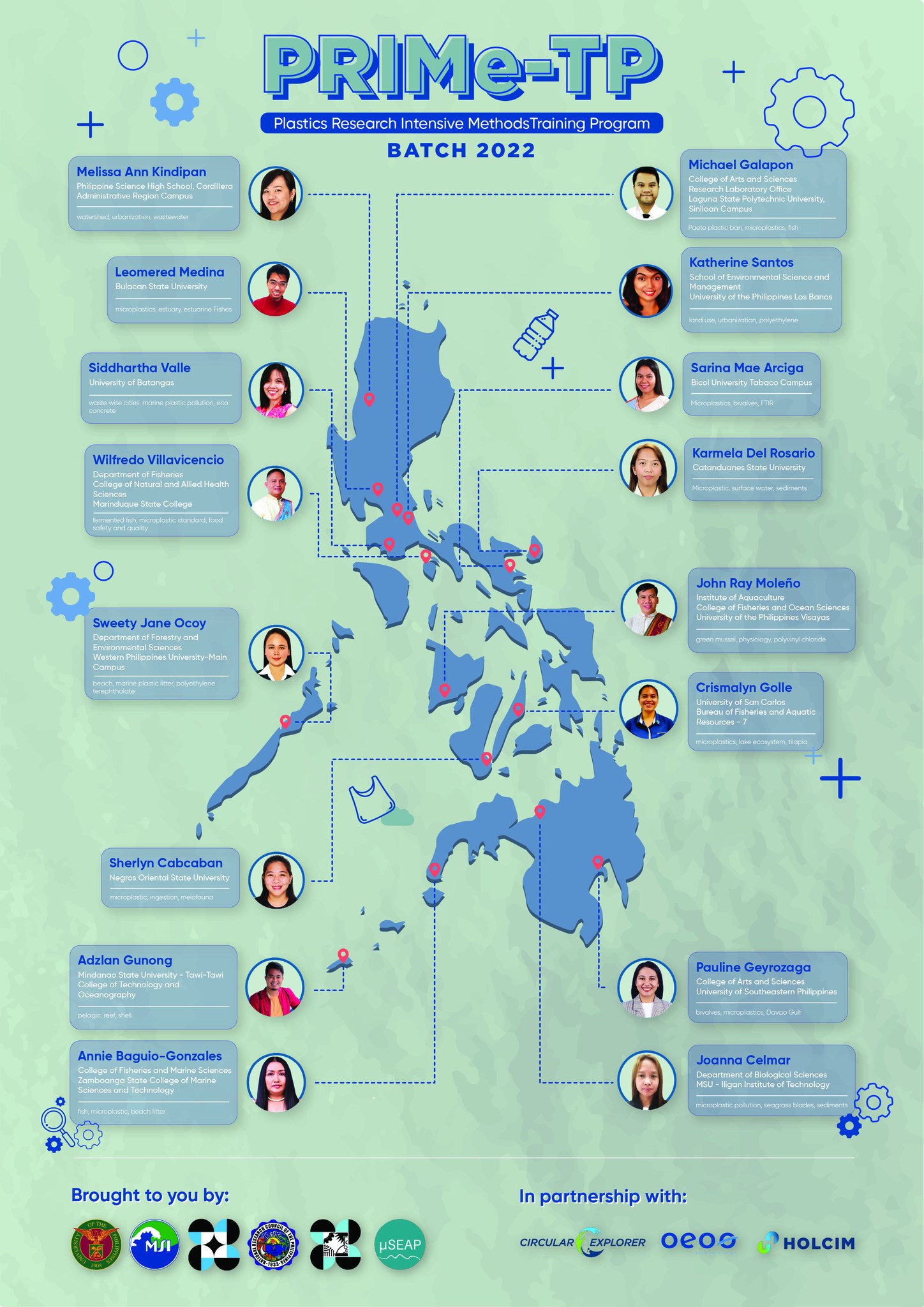With the enormity and severity of the plastics pollution problem in the country, we need more researchers looking into solutions to address it. Thus, the UP Marine Science Institute’s Microbial Oceanography Laboratory, with the support from DOST – National Research Council of the Philippines funded project PlasMics, DOST – Philippine Council for Industry, Energy and Emerging Technology Research and Development funded project PlastiCount, and UKRI-NERC funded project Microbial Transformation of Plastics in Southeast Asian Seas: A Hazard and a Solution (MicroSEAP), in partnership with One Earth, One Ocean Foundation, Circular Explorer, and Holcim Inc., recently launched a call for applicants to be part of the Plastics Research Intensive Methods Training Program (PRIMe-TP). This training program, which is the first of its kind, is open to graduate students, early-career researchers, faculty, or resident researchers of universities and colleges. Trainings such as these are essential to ensure that Filipino researchers are apprised of the best practices, processes, and emerging technology that can be utilized for plastics research.
After receiving an overwhelming number of applications, the PRIMe-TP team has narrowed down the candidates to sixteen (16) participants who will undergo the intensive training program. The participants were selected using various criteria, among them: regional representation, current involvement in plastics research, potentials for application of the methods, and the necessary opportunities for the individual or institution.
The selected participants will be attending a two-week all-expense-paid training program. A hectic but informative schedule awaits the participants with activities both in Manila and Bolinao, Pangasinan from October 14-26. In Manila, they will have the chance to learn and be exposed to initiatives to recuperate and recycle plastics from the marine environment through the Circular Explorer platform. They will also visit select materials recovery and recycling facilities. After these, they will proceed to the MicroQUIB facility in Bolinao Marine Laboratory where they will train to acquire skills in new methods and technologies for both macro- and microplastics research, such as FTIR, automated microplastics counter utilization, drone imaging, and automated application of artificial intelligence (Al) or machine learning to plastics research, among others.
The organizers hope that the participants will be able to share the knowledge they will gain to their fellow researchers in their home institutions or regions. The organizers likewise would like to thank all applicants who showed interest and sent their application to the training program. Success of the batch 2022 will hopefully lead to another batch in 2023.
The chosen participants are as follows:
1. Melissa Ann Kindipan
Philippine Science High School
Cordillera Administrative Region Campus
2. Leomered Medina
Bulacan State University
3. SiddharthaValle
University of Batangas
4. Michael Galapon
College of Arts and Sciences Research Laboratory Office
Laguna State Polytechnic University Siniloan Campus
5. Katherine Santos
School of Environmental Science and Management
University of the Philippines Los Baños
6. Wilfredo Villavicencio
Department of Fisheries College of Natural and Allied Health Sciences
Marinduque State College
7. Sweety Jane Ocoy
Department of Forestry and Environmental Sciences
Western Philippines University-Main Campus
8. Sarina Mae Arciga
Bicol University Tabaco Campus
9. Carmela del Rosario
Catanduanes State University
10. John Rey Moleño
Institute of Aquaculture College of Fisheries and Ocean Sciences
University of the Philippines Visayas
11. Crismalyn Golle
University of San Carlos
Bureau of Fisheries and Aquatic Resources Region VII
12. Sherlyn Cabcaban
Negros Oriental State University
13. Pauline Geyrozaga
College of Arts and Sciences
University of Southeastern Philippines
14. Joanna Celmar
Department of Biological Sciences
Mindanao State University Iligan Institute of Technology
15. Annie Baguio-Gonzales
College of Fisheries and Marine Sciences
Zamboanga State College of Marine Science and Technology
16. Adzlan Gunong
Mindanao State University Tawi-Tawi College of Technology and Oceanography

